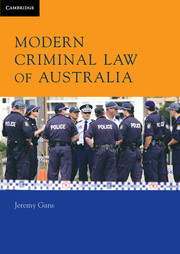2 - Choices
Summary
Introduction
Statutory words define crimes and (potential) punishments, but they cannot determine whether a particular person is a criminal or what should happen to her. Instead, various people decide each of these things. This chapter is about the role of people’s choices in Australian criminal law.
Section 2.2 explains why people’s choices play both an essential and a conflicted role in Australian criminal justice. Understanding the Australian criminal justice system involves reading both the words of statutes and the minds of people whose choices can greatly alter the impact of those statutes. The latter task is difficult indeed, but it is somewhat ameliorated by the legal regime that partially regulates criminal justice decision-making. The remainder of the chapter addresses three categories of choices and the law that regulates them:
policing, or choices about how to deal with a possible criminal
prosecuting, or choices about whether to formally determine whether someone is a criminal
regulating, or choices that can change the scope of an offence provision.
The law on a fourth set of choices – what to do with a proven offender – will be addressed in Chapter 6 (Sentences). Chapter 11 (Victims) will discuss the significance of choices by victims of crime.
- Type
- Chapter
- Information
- Modern Criminal Law of Australia , pp. 45 - 66Publisher: Cambridge University PressPrint publication year: 2011



